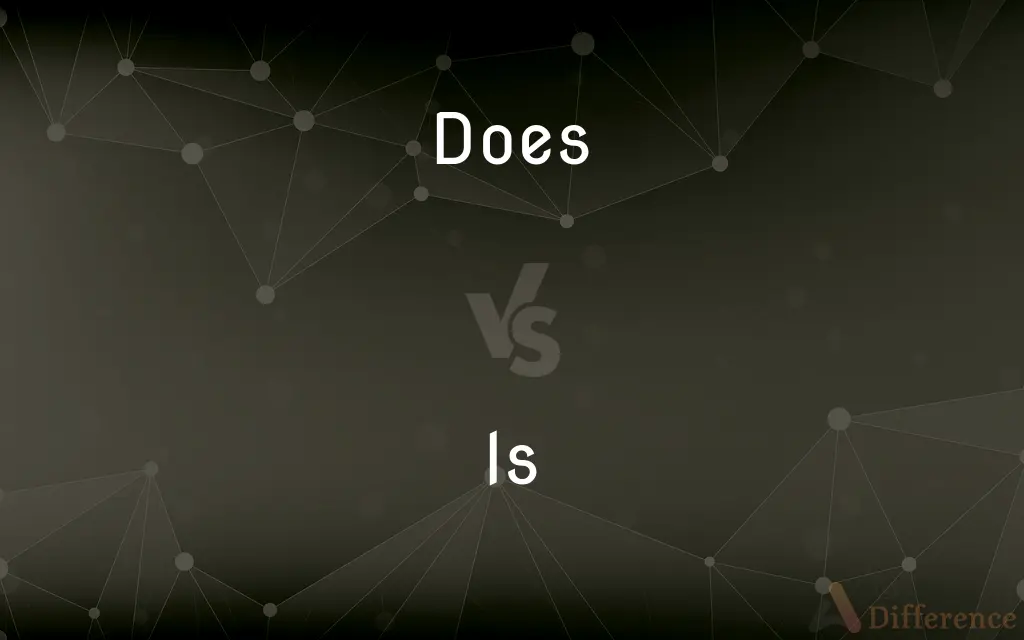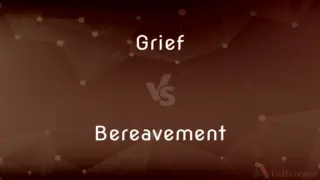Does vs. Is — What's the Difference?
By Tayyaba Rehman — Updated on September 20, 2023
"Does" is an auxiliary verb used to form questions and negatives in the simple present tense, while "Is" is a form of the verb "be" used to indicate a state or condition. They serve different grammatical purposes and are not interchangeable.

Difference Between Does and Is
Table of Contents
ADVERTISEMENT
Key Differences
"Does" is an auxiliary verb commonly used to form questions and negative statements in the simple present tense. "Is," on the other hand, is a linking verb and a form of the verb "be," used to connect the subject of a sentence with a complement that describes it. Both "does" and "is" serve different grammatical functions, and their usage is guided by different rules.
The word "does" is often used for asking questions like, "Does she know?" or making negative statements such as, "He does not understand." "Is," however, is used to make statements of being or condition, such as "She is a teacher" or "The sky is blue." Thus, "does" is action-oriented, while "is" is state-oriented.
In terms of sentence structure, "does" is followed by the base form of a main verb, as in "Does he play?" "Is," on the other hand, can be followed by an adjective, a noun, or a prepositional phrase to describe the subject, as in "He is tall," "He is a student," or "He is in the garden."
When it comes to negations, "does" is used with "not," as in "She does not eat meat." "Is" uses "not" directly after it for negation, as in "She is not a vegetarian." Although both "does" and "is" can appear in negative sentences, the way they handle negation is different.
Comparison Chart
Part of Speech
Auxiliary Verb
Linking Verb
ADVERTISEMENT
Used in
Questions, Negative Statements
Statements of Being or Condition
Followed By
Base Form of Main Verb
Adjective, Noun, Prepositional Phrase
Negation
Does + not (Does not know)
Is + not (Is not happy)
Example Usage
"Does she sing?"
"She is a singer."
Compare with Definitions
Does
An auxiliary verb used in questions.
Does he know the answer?
Is
Used to connect a subject with an adjective.
The sky is blue.
Does
Always followed by the base form of the main verb.
Does she play soccer?
Is
Used to indicate a location or state.
She is at home.
Does
Used to form negatives in the simple present tense.
She does not like spinach.
Is
Followed by a noun or pronoun to describe a subject.
This is my book.
Does
Used to emphasize an action.
He does want to come.
Is
A form of the verb "be."
He is a student.
Does
Used for singular subjects in questions and negatives.
Does it work?
Is
Can be used in negations to indicate absence of a condition.
He is not ready.
Does
Third person singular present tense of do1.
Is
Third person singular present indicative of be.
Does
Plural of doe
Is
Used in phrases with existential there when the semantic subject is a third-person plural.
There is three of them there.
Is
(Geordie) me.
Is
(rare) i's.
Is
The third person singular of the substantive verb be, in the indicative mood, present tense; as, he is; he is a man. See Be.
For thy is I come, and eke Alain.
Aye is thou merry.
To-morrow is the new moon.
Common Curiosities
What is Does?
"Does" is an auxiliary verb used in questions and negatives in the simple present tense.
Are Does and Is interchangeable?
No, they serve different grammatical purposes.
What is Is?
"Is" is a form of the verb "be," used to indicate a state or condition.
How is Is used in statements?
"Is" connects the subject with a descriptor, as in "She is tall."
What comes after Does?
The base form of the main verb follows "does."
How do you negate a sentence with Is?
Use "is not" after the subject, as in "He is not happy."
What can follow Is?
An adjective, a noun, or a prepositional phrase can follow "is."
How is Does used in questions?
"Does" precedes the subject and main verb, as in "Does he know?"
Can Is be used for plural subjects?
No, "are" is used for plural subjects.
Is Does used for emphasis?
Yes, it can be used to emphasize an action.
Is Is used for emphasis?
No, it is not typically used for emphasis.
Can Does be used for plural subjects?
No, "do" is used for plural subjects.
How do you negate a sentence with Does?
Use "does not" before the main verb, as in "He does not sing."
What tense is Does used in?
Simple present tense.
What tense is Is used in?
Present tense, either simple or continuous.
Share Your Discovery

Previous Comparison
Interest vs. Intent
Next Comparison
Grief vs. BereavementAuthor Spotlight
Written by
Tayyaba RehmanTayyaba Rehman is a distinguished writer, currently serving as a primary contributor to askdifference.com. As a researcher in semantics and etymology, Tayyaba's passion for the complexity of languages and their distinctions has found a perfect home on the platform. Tayyaba delves into the intricacies of language, distinguishing between commonly confused words and phrases, thereby providing clarity for readers worldwide.















































